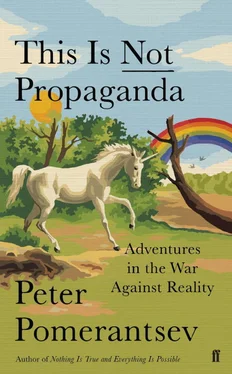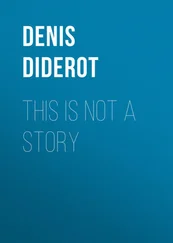Lyudmilla tried to reach out to Stas, the co-author of the Cantadora blog whom she had liked, but he just sent her bitter messages full of swear words. This saddened her: she knew he hated the farm and hoped he’d understand her mission.
Lyudmilla had hoped that by unmasking the workings of the IRA she would cause so much outrage it would help stop its work, that she would shock people into seeing how they were being manipulated by it, shame those who worked there into resigning. Most of the people she had met at the farm were no monsters. They carried on working there because there was little social stigma linked to it.
But instead of an outcry she found that many people, including fellow activists, just shrugged at the revelations. This horrified her even more. Not only did the lies churned out by the farm become reality, but the very existence of it was seen as normal in itself.
At one point the death threats and abuse unnerved Lyudmilla so much she began to get anxiety attacks and went to see a psychotherapist. The psychotherapist listened to her patiently, nodded and then enquired why she wanted to fight the state this way – was she some kind of paid-for traitor? Lyudmilla, perturbed, visited another doctor. They said the same thing again. She felt as if the mindset promoted by the troll factory had literally penetrated into the country’s subconscious. She had left the confines of the farm – only to find she was enveloped by it everywhere.
Then, in early 2018, the US Special Counsel Investigation found that the operations of the troll farm had stretched beyond Russia and deep into the US, creating thousands of fake accounts, groups and messages, while posing as genuine Americans: right-nationalist, gun-loving Americans who supported the election of Donald Trump; black civil rights campaigners who promoted the idea that his rivals weren’t worth voting for. The activity continued after the 2016 election, as the farm tried to make Americans hate each other even more. Over thirty million Americans shared its content among their friends and families. [14] Howard, Philip, Bharath Ganesh et al., ‘The IRA, Social Media and Political Polarization in the United States, 2012–2018’ (Oxford, UK: Computational Propaganda Research Project, 2019); https://comprop.oii.ox.ac.uk/wp-content/uploads/sites/93/2018/12/The-IRA-Social-Media-and-Political-Polarization.pdf .
Certainly, thought Lyudmilla, the US would punish the troll farm. She’d always noted how authors at the IRA would write screeds about how awful the West was through their troll personas, while dreaming of American holidays on their real-life walls. Even the most basic threat of a travel ban to the US, she reckoned, would be enough to put many off from working at the farm, undermine the sense that it was just another normal job.
She would be disappointed. The US Special Counsel opened cases against a few mid-level administrators for technicalities like using fake identities to open bank accounts, but not only did the farm not shut, it expanded to premises three times the size.
When I asked American government lawyers why sanctions couldn’t be imposed on trolls, they answered that, firstly, it was hard to define whether the IRA worked directly for the Russian government, and therefore whether its actions constituted the operations of a ‘hostile state’. And in any case, while the scale of the IRA’s activities was spectacular, it was barely unique. Western PR companies were regularly caught running similar operations, using fake online personas for their clients. The American military had started a project called ‘Earnest Voice’ in 2011, which ran fake online accounts to counter terrorist messaging in the Middle East. It wasn’t just the Russians who were using technology in this way. [15] Cave, Andrew, ‘Deal that Undid Bell Pottinger: Inside Story of the South Africa Scandal’, Guardian, 5 September 2017; https://www.theguardian.com/media/2017/sep/05/bell-pottingersouth-africa-pr-firm . Fielding, Nick and Ian Cobain, ‘Revealed: US Spy Operation That Manipulates Social Media’, Guardian, 17 March 2011; https://www.theguardian.com/technology/2011/mar/17/us-spy-operation-social-networks .
, [16] DiResta, Renee, Kris Shaffer, Becky Ruppel, David Sullivan, Robert Matney, Ryan Fox, Jonathan Albright and Ben Johnson, ‘The Tactics & Tropes of the Internet Research Agency’ (Austin, TX: New Knowledge, 2018); https://disinformationreport.blob.core.windows.net/disinformation-report/NewKnowledge-Disinformation-Report-Whitepaper.pdf .
But even more importantly, I thought to myself, though one might not like what trolls write, lies are not illegal. In the ‘marketplace of ideas’, better information, the journalistic credo I had been raised with went, is the antidote to lies. After all, isn’t freedom of expression exactly what democratic dissidents, such as my parents, had always fought for?
*
Camille François thought differently. She was a scholar of cyber-warfare at Harvard University and Google, and when she first read about Lyudmilla’s research and heard Maria Ressa’s story, she felt it fitted into a greater pattern which she had observed across the world: a new version of the old game of power versus dissent, freedom of speech versus censorship, but one that turned the old rules on their head. The previous methods of silencing and breaking people had become untenable; unlike in the Soviet Union, few regimes can prevent people from receiving or propagating information. However, the powerful had adapted, and now social media mobs and cyber-militias harassed, smeared and intimidated dissenting voices into silence, or undermined their reputation so that no one would listen to them. But because the connections between states and these mobs and militias were unclear, a regime could always claim that it had nothing to do with these campaigns, that they were merely private individuals exercising their freedom of speech.
What if, thought François, you could establish the connection between states and campaigns? Could one then hold them to account?
François had begun her Internet career supporting what were known as Internet ‘pirates’ in 1990s Paris: hackers who put copyrighted music, books and software online in the name of sharing all knowledge for free. François even advocated that people should give up their passwords so that everyone could access everyone else’s Internet connections. Twenty years later, such idealism had given way to a realisation that the Internet was an increasingly dangerous place, and she became more preoccupied with Internet security. François had researched how states hack into the phones and computers of journalists and activists, especially in Latin America. Now she got back in touch with those victims and asked whether the hacks had been accompanied by online attacks. Almost everyone said they had been. Martha Roldós, an Ecuadorean politician who had swarms of online accounts threaten her, accusing her of killing her politician parents and of being a spy, perhaps put it most clearly:
In the past I was denied my political rights, I had armed men outside my house pointing a gun at my daughter… but not cyber-harassment. Since I became a sponsor of investigative journalists, my time of cyber-harassment began.
Over the next three years, between 2015 and 2018, François put together a team of twenty researchers and a coalition of civil society groups who scoured Asia and the Middle East, the Americas and Europe to categorise what she was beginning to call ‘state-sponsored trolling’. The research, part of which would later be published by the aptly named Institute for the Future, [17] Monaco, Nicholas and Carly Nyst, ‘State-Sponsored Trolling: How Governments Are Deploying Disinformation as Part of Broader Digital Harassment Campaigns’ (Palo Alto, CA: Institute for the Future, 2018); http://www.iftf.org/fileadmin/user_upload/images/DigIntel/IFTF_State_sponsored_trolling_report.pdf .
defined several categories.
Читать дальше












